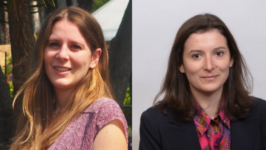Hélène Daccord (E17): "Music Can Have a Geopolitical Impact"
Hélène Daccord (E17) has published Quand la musique fait l’histoire [When Music Makes History] (Passés Composés), which tells of fifteen legendary moments when music played a key role in orchestrating history. Interview.
ESSEC Alumni: How did you develop an interest in the links between music and geopolitics?
Hélène Daccord: I studied violin at the Conservatoire de Pau, and was lucky enough to be able to pursue my passion while at ESSEC. With some of my classmates, I began by creating the ESSEC Symphony Orchestra (OSE), which rapidly became an inter-school orchestra for campuses in the Cergy area. I then took over the running of the Arts Office and launched numerous musical events with my team and other artistic organisations on campus. At the same time, I took a parallel course in geopolitics at ENS Ulm. At the end of my studies, the idea to link both fields came to me.
EA: What is your book about?
H. Daccord: This book, written for all audiences, looks back at fifteen legendary moments when music played a backstage role in international relations and when the clash of arms was silenced by the harmony of music. From Rostropovitch’s concert at the Berlin Wall in 1989 to the 19th-century awakening of Italian and German patriotism thanks to the symbolic figures of Verdi and Wagner, I show how notes, even without words, can have a political impact.
EA: How did you lead your research?
H. Daccord: I spent hours hunting through archives, scientific journals and specialised publications. The Châtelet music library in particular was a goldmine of information. I then looked for the red thread which would lend coherence to all the fascinating stories I’d collected. I especially recommend the often hilarious connections between Beethoven and Nadia Boulanger!
EA: Of the fifteen ‘legendary moments’ you explore, which one is your favourite?
H. Daccord: The story of the New York Philharmonic Orchestra is just incredible: in the midst of a nuclear crisis in 2008, the North Korean regime decided to invite 250 Americans to Pyongyang! Did this invitation reflect Kim Jong Il’s desire to normalise diplomatic relations? Was this symphonic diplomacy or simply another form of entertainment for the North Korean regime? We can draw a parallel between this tour and the famous ‘ping-pong diplomacy’ which helped to thaw China-US relations during the Cold War, as John Adam’s opera, Nixon in China, so brilliantly recounts.
EA: Did you uncover any unknown history, or at least facts that had never been studied or shared?
H. Daccord: Hundreds! Half the stories I tell in my book were initially unknown to me. I think you can tell that from the writing; I discover the stories at the same time as the reader. Why were the treatises on Arab music, which remain a reference to the present day, written in French? Why did Rostropovitch choose to play Bach during the fall of the Berlin Wall on 11 November 1989? Why has a woman never been appointed permanent conductor of one of France’s national orchestras?
EA: The answers to these questions also provide insight into current affairs. Music still plays a geopolitical role today...
H. Daccord: More than ever, yes. Since 24 February 2022, numerous Russian artists have been urged to take a stand on the war in Ukraine and have seen their contracts and concerts cancelled because of their political views. At the same time, many cultural institutions have ended their partnerships with venues in Moscow or Saint Petersburg. Some orchestras have added the Ukrainian national anthem to their performances, while others have gone so far as to remove Mussorgsky or Tchaikovsky from their repertoire. These recent events are a reminder of how music and performers cannot ignore the historical context of their time. Everything is significant, from the choice of conductors to performers’ nationality, the names of works, or concert dates and venues.
Interview by Louis Armengaud Wurmser (E10), Content Manager at ESSEC Alumni
Do you want more quality content about the ESSEC community? Join us now!

Comments0
Please log in to see or add a comment
Suggested Articles


